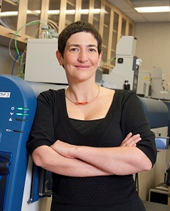Skip to content. | Skip to navigation
Personal tools

- Contact Us |
- Seminars |
- Donate

Lunenfeld-Tanenbaum
Research Institute
Mount Sinai Hospital
Joseph & Wolf Lebovic Health Complex
992A-600 University Avenue
Toronto Ontario
M5G 1X5
Tel.: 416-586-4800 ext.8272
► Web of Science Researcher ID
E-9982-2010
Dr. Anne-Claude Gingras
SENIOR INVESTIGATOR,
DIRECTOR,
LUNENFELD-TANENBAUM
RESEARCH INSTITUTE
VICE PRESIDENT, RESEARCH
SINAI HEALTH
Dr. Anne-Claude Gingras is an expert in mass spectrometry-based proteomics, a technology that enable the identification and quantification of proteins from biological samples. She develops tools to better understand how proteins associate with one another to perform their activities.
She is in particular interested in understanding how signals that are received by each of the cells forming a human body are interpreted. Such signals include hormones and growth factors that can instruct the cell to grow and divide, as well as the availability of nutrients. A cell also must respond to other types of cues, and notably monitor its spatial constraints. When the cellular response to these signals is defective, pathologies such as cancers can arise. By systematically employing proteomics approaches, alongside molecular biology, cell biology and genetics techniques, Dr. Gingras is providing a better understanding of the key signalling pathways that control cell and tissue growth in normal and disease states.
Dr. Gingras is also harnessing proteomics methods to better understand the intricate spatial organization of all proteins inside a human cell. To do so, she is primarily delivering within cells enzymatic fusions of proteins that can mediate the attachment of a permanent tag to other proteins that are located in the same neighbourhood. She can then identify the tagged proteins using mass spectrometry. Using this powerful approach, she has already provided new insight regarding the composition and organization of structures inside the cells called stress granules that have been implicated in neurodegenerative diseases. She is now systematically defining the “residential address” of each protein expressed in a human cell in order to provide a reference map to further study disease biology, with a focus on rare genetic diseases.
Dr. Gingras’ team is innovative and highly collaborative, which enable local, national and international colleagues to more rapidly tackle challenging biomedical questions.
At a Glance
Develops and uses proteomics tools to better understand how the human cell is organized and how it responds to signals.
Co-directs (with Dr. Jeff Wrana) the Network Biology Collaborative Centre, a Genome Canada supported technology platform.
Is Deputy Editor for the leading journal in the proteomics field, Molecular and Cellular Proteomics.
Holds the Canada Research Chair in Functional Proteomics and the Lea Reichmann Chair in Cancer Proteomics
Major Research Activities
Dr. Gingras develops techniques using mass spectrometry to study interactions between proteins, as well as the networks of cellular pathways involved in health and disease, and how they control cell growth and proliferation. This knowledge has important implications for cancer, an illness in which the normal mechanisms of cell growth are disrupted, as well as in neurodegenerative and rare genetic diseases.



